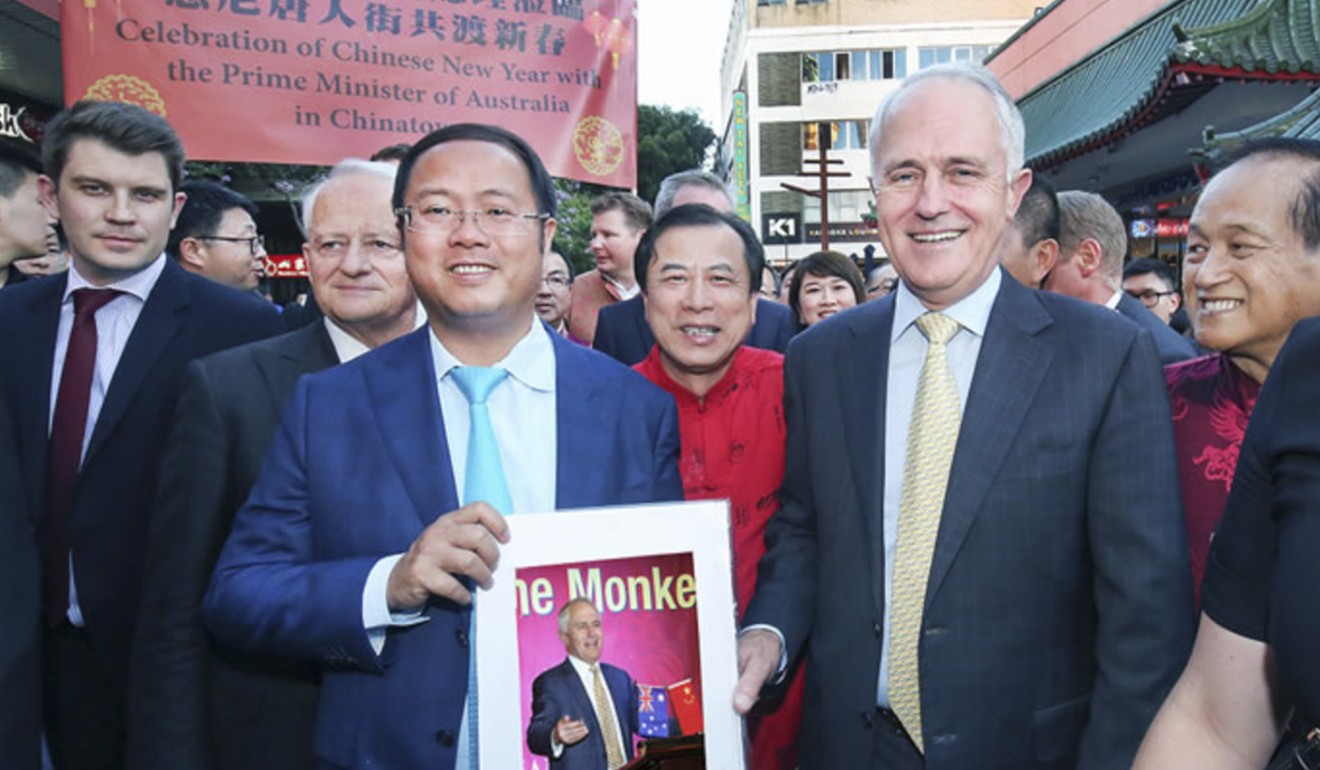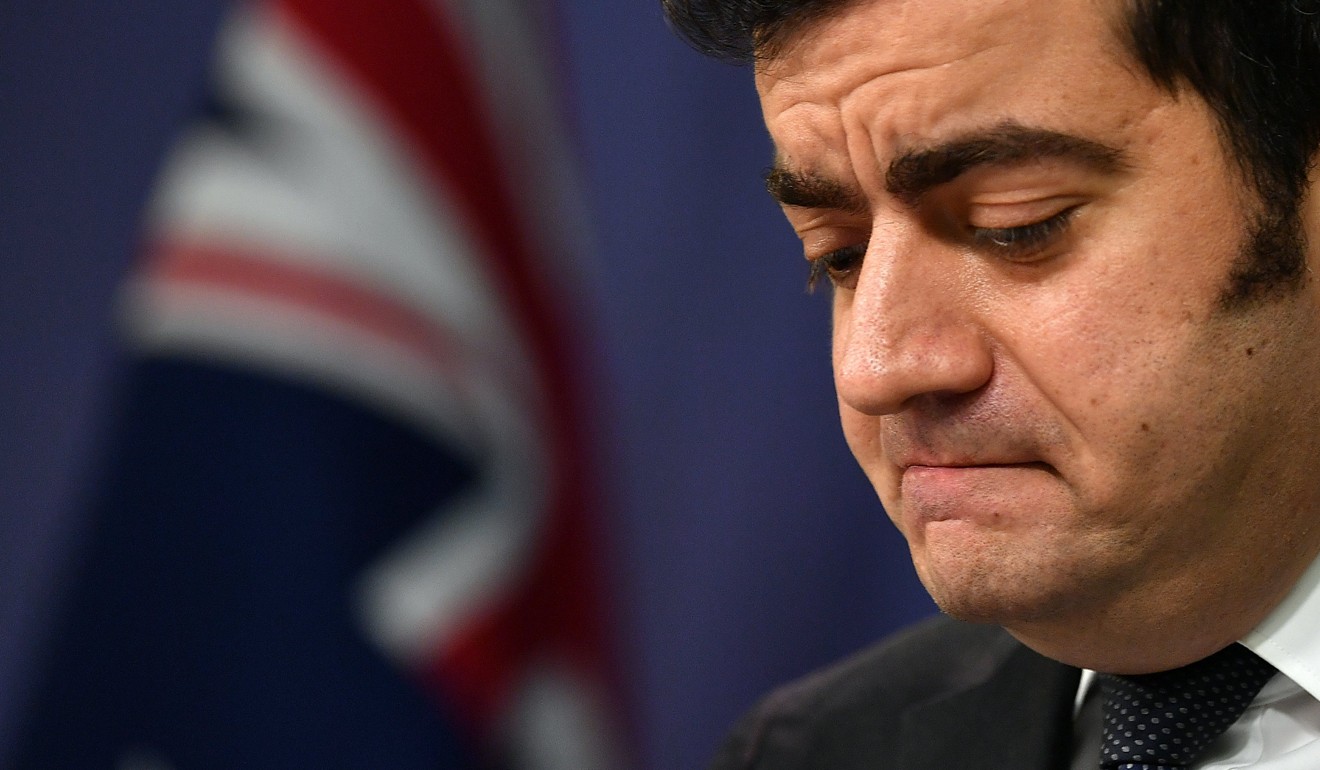
Chinese billionaire Huang Xiangmo claims persecution by ‘dark forces of Australia’s deep state’
- Usually reclusive tycoon lashes out at politicians, agencies and media, calling tax office a ‘despicable tool’ for its pursuit of US$104 million tax bill
- Huang, a major political donor, has had his assets frozen and permanent residency cancelled over fears of foreign political interference

Chinese billionaire Huang Xiangmo has called the tax office a “despicable tool for political persecution” over its pursuit of an alleged unpaid A$140 million (US$104 million) tax bill, saying “unknown dark forces” and an Australian “deep state” were conspiring against him.
The normally reclusive property developer – whose Australian permanent residency was cancelled on advice from the Australian Security Intelligence Organisation (Asio) in December over fears of foreign political interference – condemned Australian politicians, government agencies and the media for what he described as their “amazingly synergised collaboration” in attacks on him.
“All allegations against me have been groundless in nature,” he said.
“Be it a political donation or an alleged tax burden, it all leads to fictional tales fabricated in a vacuum. Even more shockingly, some government agencies have actually taken or attempted to take some ‘deep state-style’ actions against me based on those fictions. This is the real woe of Australia and where the actual risk lies for the country.”

Huang says he was never a spy or an “agent of influence” for the Chinese Communist Party.
“Over the years, some representatives of the ‘deep state’ in Australia have repeatedly accused me of being an ‘agent of influence’. Yet, despite years of stringent investigation on me, the Asio had to eventually admit that there was not even a hair of evidence for such allegation.”
The Guardian has sought an interview with Huang over a number of matters, both in Australia and overseas. He provided a statement – in English and Chinese – overnight.
Despite his exile from Australia, Huang has remained starkly prominent in public and political debate over Chinese government influence in the country.
Last month the Independent Commission Against Corruption heard evidence that he had given an illegal A$100,000 (US$74,500) donation to the New South Wales Labor party delivered in cash in an Aldi shopping bag to the party’s general secretary.
Huang was banned from donating because he was a property developer, but the donation was allegedly masked because it was funnelled through a series of fake donors.
Simultaneously, though unrelated, the tax office has launched a federal court bid over an alleged unpaid A$140 million tax bill, arguing before the federal court that Huang “grossly understated” his income to avoid tax.
The tax office says Huang has moved nearly A$50 million (US$37 million) out of Australia since he was banned from the country. The ATO says the billionaire does not have enough assets in Australia to pay the bill and may move to bankrupt him to retrieve the debt.
By taking advantage of its tax collection power for the purpose of political character assassination and persecution, the ATO has turned into a political weapon
Huang arrived in Australia in 2011 – establishing the Yuhu Group property development firm in 2012 – and assiduously cultivated influence with both sides of Australian politics during this time in the country, donating at least A$2.7 million (US$2 million) to both the Liberal and Labor parties and appearing in photographs with prime ministers and ministers.
His permanent residency visa was summarily cancelled last December by the Morrison government on character grounds and his application for Australian citizenship withdrawn.
Asio boss Duncan Lewis warned both Labor and the Coalition in 2015 against accepting any more money from Huang, arguing that his close links with the Chinese Communist Party meant his beneficence would come with expectations of access and influence.
Of particular concern was Huang’s long-running involvement with the Australian Council for the Promotion of the Peaceful Reunification of China, which has been accused of being a front for Chinese government efforts to expand its global influence.
Huang was also the central figure in the downfall of the Labor senator Sam Dastyari, who was forced to resign from parliament after revelations he had asked Huang for money to pay personal legal bills and warned the tycoon he was under surveillance.
As well, Huang also remains involved in a stalled development at one of the most prominent addresses in Australia, One Circular Quay. Work on the A$550 million (US$410 million) apartment and hotel development has ground to a halt, with industry sources saying there is no builder for the project.
Huang said the tax office’s case against him was politically motivated.
“Paying taxes according to law is a fundamental tenet that I have never once failed as an honest businessman,” he said. “This holds true throughout my personal and business life in mainland China, Hong Kong and Australia. My reputation is as precious as life itself. Never have I ever had any history of default anywhere, let alone any record of tax evasion.”

Huang said he always been “proactive and cooperative” with the tax office, and transparent in his declarations. The case returns to court on Thursday.
“The ATO is believed to be a professional government agency with some integrity but it really pains and saddens me that it has now surrendered itself to the pressure of some unknown dark forces, almost allowing itself to become a tool for political persecution against me.”
Huang said the tax office had made errors in assessing his tax debt, based on how it evaluated properties he owned in China. He said this led to a “sensationally high” tax bill.
“By taking advantage of its tax collection power for the purpose of political character assassination and persecution, the ATO has turned into a political weapon.”
The ATO has sought and won a worldwide freeze on all of Huang’s assets while it pursues the alleged tax bill.
In making the freezing order, Justice Anna Katzmann told the federal court: “The results of the audit indicate an intention to avoid paying tax by grossly understating income … these circumstances demonstrate that Mr Huang has both a motive and the means to dissipate his Australian assets.”
Huang said he suspected that the ATO’s action was “a political tool to facilitate some dark forces in an attempt to ruin my reputation, cut off my business network and intimidate my business partners” and complained that it had followed the Morrison government’s decision in December to tear up his permanent residency.
“ATO’s dramatic act not only contradicts its usual practices as a professional agency but also transcends the professional competence and ethical tolerance of ATO personnel involved in previous communications and with knowledge of the case,” Huang said.
“First to deprive me of my residency on groundless allegations, then a further attempt to seize my assets with unfounded claims – this is an egregious abuse of power that sends chills down my spine as I would never have expected it of Australia, a country ruled by law, supposedly,” he said.
The Guardian has approached the tax office for comment.